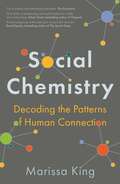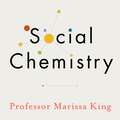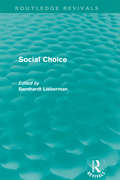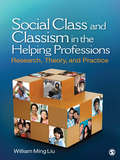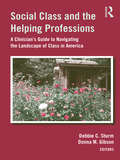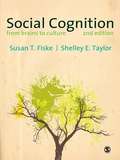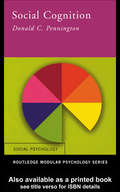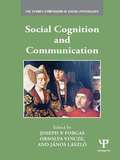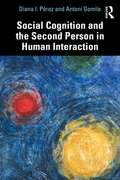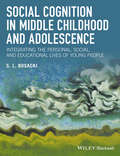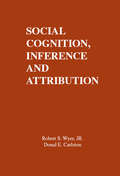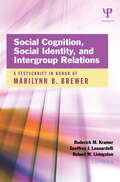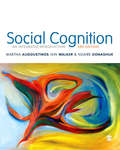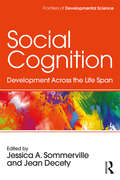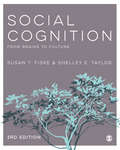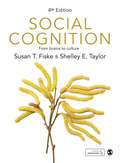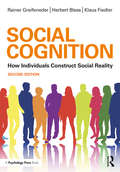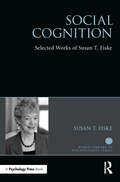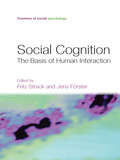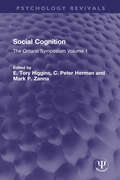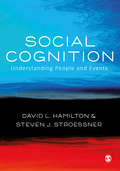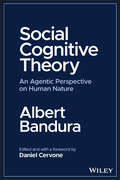- Table View
- List View
Social Chemistry: Decoding the Patterns of Human Connection
by Marissa King'full of wisdom and entertaining anecdotes' The Economist'fascinating' Financial Times Social Chemistry will utterly transform the way you think about 'networking.' Understanding the contours of your social network can dramatically enhance personal relationships, work life, and even your global impact. Are you an Expansionist, a Broker, or a Convener? The answer matters more than you think. . . . One of 2021's Most Highly Anticipated New Books--Newsweek One of The 20 New Leadership Books--Adam GrantOne The Best New Wellness Books Hitting Shelves In January--Shape.com A Next Big Idea Club Nominee__________Conventional wisdom would have us believe that it is the size of your network that matters: how many people do you know? We're told to mix, mingle, and connect.But social science research suggests otherwise. The quality and structure of our relationships have far greater impact on our personal and professional lives. our relationships with friends, family, co-workers, neighbours, and collaborators are by far our greatest asset. Yet, most people leave them to chance.In this ground-breaking study, Marissa King, Professor of Organizational Behavior at the Yale, argues that there are strategic ways in which we can alter our relationships for a happier and more fulfilling life. With new understanding, this book can help readers to see how they can harness the power of their networks in their personal relationships, at work, and to create a better world.
Social Chemistry: Decoding the Patterns of Human Connection
by Marissa KingSocial Chemistry will utterly transform the way you think about 'networking.' Understanding the contours of your social network can dramatically enhance personal relationships, work life, and even your global impact. Are you an Expansionist, a Broker, or a Convener? The answer matters more than you think. . . . Conventional wisdom would have us believe that it is the size of your network that matters: how many people do you know? We're told to mix, mingle, and connect.But social science research suggests otherwise. The quality and structure of our relationships have far greater impact on our personal and professional lives. our relationships with friends, family, co-workers, neighbours, and collaborators are by far our greatest asset. Yet, most people leave them to chance.In this ground-breaking study, Marissa King, Professor of Organizational Behavior at the Yale, argues that there are strategic ways in which we can alter our relationships for a happier and more fulfilling life. With new understanding, this book can help readers to see how they can harness the power of their networks in their personal relationships, at work, and to create a better world.(P)2021 Penguin Random House Audio
Social Choice (Routledge Revivals #Vol. 1)
by Bernhardt LiebermannFirst published in 1971, Social Choice is both a text and reference containing the proceedings of a conference dealing with contemporary work on the normative and descriptive aspects of the social choice problem. This reissue will be of interest to advanced undergraduate and graduate courses on group decision making and social choice. Economists, social psychologists, political scientists and sociologists will welcome this valuable work.
Social Class and Classism in the Helping Professions: Research, Theory, and Practice
by William Ming LiuProvide your students with engaging material on social class and classism The impact of social class and classism on mental health functioning crosses racial, ethnic, and social lines and significantly contributes to our overall well-being. Any attempt to understand individuals must include an understanding of how economic issues and class have contributed to their difficulties. In Social Class and Classism in the Helping Professions, author William Ming Liu presents theory and research on the impact of classism and social class on mental health. He provides an original framework—the Social Class Worldview Model—for exploring each person′s individual and subjective life experiences. These experiences form a perspective that is unique to the individual. The author then helps the reader integrate this realization into the study of poverty, economic inequality, wealth, and the often overlooked implications of greed, materialism, and consumerism for a more complete understanding of social class and classism. Intended Audience This text is intended as a supplement for graduate and advanced undergraduate courses that address psychological and counseling theories, multicultural counseling, and research in the helping professions. These courses may be found in departments of counseling, rehabilitation, psychology, education, nursing, and social work.
Social Class and the Helping Professions: A Clinician's Guide to Navigating the Landscape of Class in America
by Donna M. Gibson Debbie C. SturmThis book provides a comprehensive examination of the intersection of social class and the helping professions, including examinations of the role of social class in American culture, classism, social class and mental health, and the American Dream. It will be a valuable tool for practitioners in a variety of mental health professions, providing a clearer understanding of social class as it relates to themselves and their clients. The first section contains an introduction to the global, historical, and sociological aspects of class and an in-depth look at urban and rural poverty, the middle class, and the upper class and economic privilege. The reader will find not only an examination of these social constructs, but also an opportunity to examine their own experience with social class. The next section brings the reader into the world of their clients in more specific ways, examining the role social class plays in mental health and mental health counseling, in the family structure and in counseling families, and in the experiences people have throughout the educational process and in schools. Finally, the last section of the book discusses specific techniques and models to use in the reader’s clinical practice, including how to assess clients’ experiences of class and classism and how these experiences have shaped their worldview and view of the self. Case studies throughout demonstrate fair and accurate diagnosis, assessment, and treatment.
Social Cognition
by Shelley Kathleen Taylor Susan FiskeIn Social Cognition: From Brains to Culture 2nd Edition, Fiske and Taylor carefully integrate the many new threads of social cognition research that have emerged in the intervening years since the previous edition, including developments within social neuroscience, cultural psychology and some areas of applied psychology, and continue to tell a powerful and comprehensive story about what social cognition is and why it's a significant phenomenon in society today. Every updated chapter now includes more figures and tables, glossary entries, and further readings. A supplemental test bank including some full-text journal articles corresponding to chapters in the book is available online at: www.sagepub.co.uk/fiskeandtaylor.<P><P> This textbook will be indispensable to students of social cognition and social psychology worldwide, at undergraduate or graduate level. <P> Visit the Companion Website at www.sagepub.co.uk/fiskeandtaylor
Social Cognition (Routledge Modular Psychology)
by Donald C. PenningtonSocial Cognition looks at the way in which humans interpret, analyse and remember information about the social world. Topics covered include: attribution, social schemas and social representations, prejudice and discrimination. Suitable for the AQA-A A2 and AQA-B AS level examintation, mnd students studying social cognition for the first time at undergraduate level.Series DetailsThe Routledge Modular Psychology Series is a completely new approach to introductory level psychology, tailor-made for the new modular style of teaching. Each book covers a topic in more detail than any large textbook can, allowing teacher and student to select material exactly to suit any particular course or project. Especially written for those students new to higher-level study, whether at school, college or university, the books include the following designed features to help with technique: Practice essays with specialist commentary to show how to achieve a higher grade Chapter summaries and summaries of key research Glossary and further reading Progress and review exercises.
Social Cognition and Communication: Social Cognition And Communication (Sydney Symposium of Social Psychology)
by Joseph P. Forgas János László Orsolya VinczeLanguage is the essence of interpersonal behavior and social relationships, and it is social cognitive processes that determine how we produce and understand language. However, there has been surprisingly little interest in the past linking social cognition and communication. This book presents the latest cutting-edge research from a select group of leading international scholars investigating the how language shapes our thinking, and how social cognitive processes in turn influence language production and communication. The chapters represent diverse perspectives of investigating the links between language and communication, including evolutionary, linguistic, cognitive and affective approaches as well as the empirical analysis of written and spoken narratives. New methodologies are presented including the latest techniques of text analysis to illuminate the psychology of individual language users, and entire cultures and societies. The chapters address such questions as how are cognitive and identity processes reflected in language? How do affective states influence language production? Are political correctness norms in language use effective? How do partners manage to accommodate to each other’s communicative expectations? What is the role of language as a medium of interpersonal and intergroup influence? How are individual and cultural identities reflected in, and shaped by narratives in literature, school texts and the media? The book is aimed at all students, researchers and laypersons interested in the interplay between thinking and communication, and should be required reading for all professionals who use language in their everyday work to interact with people.
Social Cognition and the Second Person in Human Interaction
by Antoni Gomila Diana I. PérezThis book is a unique exploration of the idea of the "second person" in human interaction, the idea that face-to-face interactions involve a distinctive form of reciprocal mental state attributions that mediates their dynamical unfolding. Challenging the view of mental attribution as a sort of "theory of mind", Pérez and Gomila argue that the second person perspective of mental understanding is the conceptually, ontogenetically, and phylogenetically basic way of understanding mentality. Second person interaction provides the opportunity for the acquisition of concepts of mental states of increasing complexity. The book reviews the growing interest in a variety of second person phenomena, both in development and in adulthood, presenting research that shows how participants in human interaction attribute psychological states of a referentially transparent kind to each other. This review documents the spontaneous preference for face-to-face interaction, from eye contact to joint attention, from forms of vitality to communicative intentions, from interaction detection to joint action, and from synchrony to interpersonal coordination. Also looking at the implications and applications of the second person perspective within fields as diverse as art and morality, this book is fascinating reading for students and academics in social and cognitive psychology, cognitive science, neuroscience, and philosophy.
Social Cognition in Middle Childhood and Adolescence: Integrating the Personal, Social, and Educational Lives of Young People
by Sandra BosackiBridging psychological theory and educational practice, this is an innovative textbook on the emotional and social aspects of young people's development. Bosacki's Social Cognition in Middle Childhood and Adolescence, First Edition moves beyond tradition cognitivist representations of how children learn and grow, focusing on how to integrate the emotional, cognitive, moral, spiritual and social in young people's experiences. This text bridges the gap between theory and practice; analyses cutting edge research and translates it into culturally sensitive and developmentally appropriate strategies for future educational practice.
Social Cognition, Inference, and Attribution
by R. S. Wyer, Jr. D. E. CarlstonFirst published in 1979.This book developed out of a series of general discussions between the authors on research and theory in person perception and attribution phenomena. During the course of this discussion, two things became clear. First, many of the traditional approaches to investigating these phenomena, made popular during the past decade by the advent of algebraic models of information integration, were not providing answers to several fundamental questions concerning the manner in which social stimulus information is interpreted, organized, and stored in memory, and the factors that affect its retrieval and use in making judgments of the people and events to which it is relevant. Second, many fundamental issues associated with the processing of social stimulus information were relevant to phenomena investigated in a variety of traditionally segregated areas (e.g., impression formation, attribution, social comparison, interpersonal attraction, belief and opinion change, etc.). However, these commonalities were rarely identified. This appeared to result from a tendency to focus on micro-theoretical formulations developed to account for a circumscribed set of phenomena, without considering these phenomena within a broader conceptual framework. This book is an attempt to respond to these various deficiencies.
Social Cognition, Social Identity, and Intergroup Relations: A Festschrift in Honor of Marilynn B. Brewer (Psychology Press Festschrift Series)
by Roderick M. Kramer Geoffrey J. Leonardelli Robert W. LivingstonPerhaps the defining feature of humanity is the social condition -- how we think about others, identify ourselves with others, and interact with groups of others. The advances of evolutionary theory, social cognition, social identity, and intergroup relations, respectively, as major fields of inquiry have been among the crowning theoretical developments in social psychology over the past three decades. Marilynn Brewer has been a leading intellectual figure in the advancement of each of them. Her theory and research have had international impact on the way we think about the self and its relation to others. This festschrift celebrates Marilynn’s numerous contributions to social psychology, and includes original contributions from both leading and rising social psychologists from around the world. The volume will be of interest to social psychologists, industrial/organizational psychologists, clinical psychologists, and sociologists.
Social Cognition: An Integrated Introduction
by Dr Iain Walker Ngaire Donaghue Dr Martha Augoustinos'A rich intellectual feast for the reader and for the field, one that represents both theories and data that have emerged from around the world' - Kay Deaux, Distinguished Professor of Psychology and Women's Studies, City University, New York `The time is ripe for this unique integration of the formerly disparate major approaches to social psychological issues. I highly recommend this readable and exciting review of social cognition topics. The core principles of the social cognition, social identity, social representations, and discursive approaches are clearly outlined in such a way that students will truly engage with the theories' - Nyla R Branscombe, Professor of Psychology, University of Kansas With a new structure, the Second Edition of this critically acclaimed textbook represents a much more `integrated' and pedagogically developed account of its predecessor. The authors examine the different theoretical and methodological accomplishments of the field by focusing on the four major and influential perspectives which have currency in social psychology today - social cognition, social identity, social representations and discursive psychology. A foundational chapter presenting an account of these perspectives is then followed by topic-based chapters from the point of view of each perspective in turn, discussing commonalities and divergences across each of them. Key features of Second Edition: - cross-referencing throughout the text - especially to the foundational chapter - key terms in bold which refer to a glossary at the back of the textbook - extensive pedagogical features: textboxes illustrating key studies, effective summaries and further readings in every chapter.
Social Cognition: Development Across the Life Span (Frontiers of Developmental Science)
by Jean Decety Jessica SommervilleSocial Cognition brings together diverse and timely writings that highlight cutting-edge research and theories on the development of social cognition and social behavior across species and the life span. The volume is organized according to two central themes that address issues of continuity and change both at the phylogenetic and the ontogenetic level. First, it addresses to what extent social cognitive abilities and behaviors are shared across species, versus abilities and capacities that are uniquely human. Second, it covers to what extent social cognitive abilities and behaviors are continuous across periods of development within and across the life span, versus their change with age. This volume offers a fresh perspective on social cognition and behavior, and shows the value of bringing together different disciplines to illuminate our understanding of the origins, mechanisms, functions, and development of the many capacities that have evolved to facilitate and regulate a wide variety of behaviors fine-tuned to group living.
Social Cognition: From brains to culture
by Shelley E. Taylor Susan T. FiskeHow do people make sense of each other? How do people make sense of themselves? Social cognition attempts to explain the most fundamental of questions. It looks at why other people are not simply ‘objects’ to be perceived and how the social world provides dramatic and complex perspectives on the Self and Others. The subtitle of this book ‘From Brains to Culture’ reflects the journey that Social Cognition has been on since it first emerged as a dynamic and forward-looking field of research within social psychology. Structured in four clear parts, Social Cognition: From Brains to Culture begins with a clear outline of the basic concepts before moving into more topical sections: understanding individual selves and others, followed by making sense of society. The authors finish by looking beyond cognition to affect and behaviour. Challenging and rigorous, yet strikingly accessible, this book is essential reading for all students of social psychology from undergraduate to post-graduate and beyond.
Social Cognition: From brains to culture
by Shelley E. Taylor Susan T. FiskeHow do people make sense of each other? How do people make sense of themselves? Social cognition attempts to explain the most fundamental of questions. It looks at why other people are not simply ‘objects’ to be perceived and how the social world provides dramatic and complex perspectives on the Self and Others. The subtitle of this book ‘From Brains to Culture’ reflects the journey that Social Cognition has been on since it first emerged as a dynamic and forward-looking field of research within social psychology. Structured in four clear parts, Social Cognition: From Brains to Culture begins with a clear outline of the basic concepts before moving into more topical sections: understanding individual selves and others, followed by making sense of society. The authors finish by looking beyond cognition to affect and behaviour. Challenging and rigorous, yet strikingly accessible, this book is essential reading for all students of social psychology from undergraduate to post-graduate and beyond.
Social Cognition: From brains to culture
by Shelley E. Taylor Susan T. FiskeThe social world is complicated and our minds are limited, so we take shortcuts. You have to make quick decisions – this person is dangerous, this one is not. The shortcuts we take mostly work well enough, because, after all, we survive. But some are deeply unjust, including racial or social class categories or other unfair stereotypes. This book will help you understand how these shortcuts work, why they exist, and how they are changing. There are examples in each chapter which * Show applications in the real world to help with your understanding * Highlight significant pieces of research to help you demonstrate knowledge of a wide range of sources * Explain researching in social cognition to improve your skills and give ideas for your own research. Check out the accompanying online resources for more.
Social Cognition: From brains to culture
by Shelley E. Taylor Susan T. FiskeThe social world is complicated and our minds are limited, so we take shortcuts. You have to make quick decisions – this person is dangerous, this one is not. The shortcuts we take mostly work well enough, because, after all, we survive. But some are deeply unjust, including racial or social class categories or other unfair stereotypes. This book will help you understand how these shortcuts work, why they exist, and how they are changing. There are examples in each chapter which * Show applications in the real world to help with your understanding * Highlight significant pieces of research to help you demonstrate knowledge of a wide range of sources * Explain researching in social cognition to improve your skills and give ideas for your own research. Check out the accompanying online resources for more.
Social Cognition: How Individuals Construct Social Reality (Social Psychology Ser.)
by Klaus Fiedler Rainer Greifeneder Herbert BlessSocial cognition is a key area of social psychology, which focuses on cognitive processes that are involved when individuals make sense of, and navigate in their social world. For instance, individuals need to understand what they perceive, they learn and recall information from memory, they form judgments and decisions, they communicate with others, and they regulate their behavior. While all of these topics are also key to other fields of psychological research, it’s the social world—which is dynamic, complex, and often ambiguous—that creates particular demands. This accessible book introduces the basic themes within social cognition and asks questions such as: How do individuals think and feel about themselves and others? How do they make sense of their social environment? How do they interact with others in their social world? The book is organized along an idealized sequence of social information processing that starts at perceiving and encoding, and moves on to learning, judging, and communicating. It covers not only processes internal to the individual, but also facets of the environment that constrain cognitive processing. Throughout the book, student learning is fostered with examples, additional materials, and discussion questions. With its subdivision in ten chapters, the book is suitable both for self-study and as companion material for those teaching a semester-long course. This is the ideal comprehensive introduction to this thriving and captivating field of research for students of psychology.
Social Cognition: Selected Works of Susan Fiske (World Library of Psychologists)
by Susan Professor FiskeIn the World Library of Psychologists series, international experts present career-long collections of what they judge to be their finest pieces—extracts from books, key articles, salient research findings, and their major practical theoretical contributions. Susan T. Fiske has an international reputation as an eminent scholar and pioneer in the field of social cognition. Throughout her distinguished career, she has investigated how people make sense of other people, using shortcuts that reveal prejudices and stereotypes. Her research in particular addresses how these biases are encouraged or discouraged by social relationships, such as cooperation, competition, and power. In 2013, she was elected to the National Academy of Sciences, and, in 2011, to the British Academy. She has also won several scientific honours, including the Guggenheim Fellowship, the APA Distinguished Scientific Contributions Award, the APS William James Fellow Award, as well as the European Federation of Psychologists’ Associations Wundt-James Award and honorary degrees in Belgium, the Netherlands, Spain, and Switzerland. This collection of selected publications illustrates the foundations of modern social cognition research and its development in the late twentieth and early twenty-first century. In a specially written introductory chapter, Fiske traces the key advances in social cognition throughout her career, and so this book will be invaluable reading for students and researchers in social cognition, person perception, and intergroup bias.
Social Cognition: The Basis of Human Interaction (Frontiers of Social Psychology)
by Fritz Strack Jens FörsterSocial cognition is an area of social psychology that has been flourishing over the past two decades. It has harnessed basic concepts from cognitive psychology and developed and refined them to explain human thinking, feeling, and acting in a social context. Moreover, social cognition has integrated emotional influences and unconscious processes to reach a more complete understanding of social psychological phenomena. In this volume, the reader will find a representative sample of outstanding research in the field of social cognition. The chapters address its central themes, roughly organized along the temporal axis of information processing. They include basic operations like perception, categorization, representation, and judgmental inferences. Other chapters focus on issues like social comparison, emotion, language and culture. All of the contributors are internationally-renowned experts who share with the reader their accounts of the research experience in each of their domains. Social Cognition: The Basis of Human Interaction is an invaluable resource for researchers requiring a comprehensive, yet concise, overview of the field, and may also be used by intermediate and advanced students of social cognition.
Social Cognition: The Ontario Symposium Volume 1 (Psychology Revivals)
by E. Tory HigginsOriginally published in 1981, this volume presents papers from the first Ontario Symposium on Personality and Social Psychology held at the University of Western Ontario from August 25-27, 1978. The general theme of the symposium was social cognition. The chapters have been grouped into two major parts. Chapters 1-5 focus on the implications of cognitive structures for social cognition, with particular emphasis on the nature of social schemata and the organization of social information. Chapters 6-11 focus on the consequences for social cognition of various cognitive processes and mechanisms, including verbal and nonverbal communicative processes, category accessibility, salience and selective attention, hypothesis-testing, and self-centered biases. Chapter 12 comments on the general perspectives taken in the previous chapters and suggests some additional directions for future consideration. Today it can be read and enjoyed in its historical context.
Social Cognition: Understanding People and Events
by David L. Hamilton Steven N. StroessnerSocial cognition is an approach to understanding how people think about people and events. We are constantly processing information to navigate the world we live in. The authors will guide your students, using examples and up-to-date studies, through this approach; from explaining the processes themselves right through to demonstrating the role cognitive processes play in our social lives. With chapters on the following processes: · Memory · Judgement · Attention · Attribution · Evaluation · Automatic processing. This book will provide your students with a framework for understanding the most common areas of interest for Social Cognition, such as perception, attitudes and stereotyping.
Social Cognition: Understanding People and Events
by David L. Hamilton Steven N. StroessnerSocial cognition is an approach to understanding how people think about people and events. We are constantly processing information to navigate the world we live in. The authors will guide your students, using examples and up-to-date studies, through this approach; from explaining the processes themselves right through to demonstrating the role cognitive processes play in our social lives. With chapters on the following processes: · Memory · Judgement · Attention · Attribution · Evaluation · Automatic processing. This book will provide your students with a framework for understanding the most common areas of interest for Social Cognition, such as perception, attitudes and stereotyping.
Social Cognitive Theory: An Agentic Perspective on Human Nature
by Albert BanduraA comprehensive perspective on human nature by one of the undisputed masters of the psychological sciences The final book by psychology's most eminent modern figure, Dr. Albert Bandura, is the definitive concise presentation of his theoretical views. In Social Cognitive Theory: An Agentic Perspective on Human Nature, Bandura explains how his half-century of research and theory on the determinants of thought and action highlight people's capacity for agency: the ability to exert control over one's actions and the courses of one's development. He further explains how his basic theory and research have been applied, world-wide, for the betterment of the human condition. Readers will find: A thorough introduction to the author’s agentic-perspective on human nature Dr. Bandura's theoretical analyses of moral behavior and moral disengagement Applications of the basic principles of Social Cognitive Theory to personal and social change for human betterment An essential and groundbreaking resource for educational, health, and personality psychologists, Social Cognitive Theory: An Agentic Perspective on Human Nature will also prove indispensable to social and industrial/organizational psychologists.
